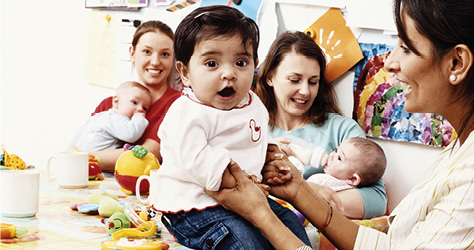Making friends, jumping in puddles, preparing for school
It’s amazing watching your pre-schooler grow up, but it’s also easy to get anxious about their development. Here’s how not to worry.
At a glance
- What is 'normal'?
- Skills development

We all want our pre-schoolers to develop into the loving, confident and happy people we know they can be.
But that does mean we sometimes get a bit paranoid about whether they’re keeping up with other kids the same age – particularly when they start at playgroup or nursery and suddenly seem to be surrounded by mini geniuses who can already count to 20 and talk in whole sentences.
It can be hard not to panic sometimes, but it’s worth remembering that there’s a vast range of what’s ‘normal’ at the ages or two to four. Some two-year-olds are able to hold a conversation, but most are only just starting to put two words together and a few may only have 20 or so single words. Some have been walking since they were ten months old and are now on to kicking a ball; others have only just got up and taken their first wobbly steps.
As child development expert Dr. Dorothy Einon says, much of a baby and toddler’s development is pre-programmed. Research shows that identical twins walk pretty much on the same day, and even if you practise intensively with one twin, they only do it three weeks earlier.
And just because a child does something early, it doesn’t necessarily mean they will still be ahead at aged five or eight (or thirty!). Experts who work with gifted children say it’s really difficult to tell whether a young child is naturally clever or if it’s just that they’ve mastered a particular skill – like talking, walking or reading – unusually early. In fact, when experts are assessing future cleverness, they look for a certain “twinkle in the eye” of a child; a curiosity, an alertness, rather than brilliant talking or reading.
It’s never a great idea to be constantly comparing your pre-schooler to others
They do things at such different speeds even within families. As a mum with several children can tell you, there may be one who walked at ten months but didn’t talk until two, but a brother or sister who talked in sentences at two but couldn’t run without falling over.
As mums, particularly first-timers, it’s tempting to think of them as carbon copies of us – little mini-me’s we have joyfully brought into the world. But as we watch their personalities evolve in the pre-school years it can come as quite a jolt to realise that they will have different likes and skills to us.
However, there are some problems to watch out for. You should ask your health visitor for advice if your pre-schooler:
- Has problems with understanding.
- Has difficulties with hearing or sight (get any sign of a squint checked out immediately).
- Find it difficult to make eye contact and has problems interacting with other children and adults.
- Is very behind with their speech, as research shows they may find it hard to catch up at school. By three, speech therapists say they should be putting three words together (‘mummy drive car’) and we should be able to understand 75-100% of what they say.
It’s a case of trusting your instincts. If they’re a little bit behind on some skills but you feel everything is fine, hold your nerve. But never be afraid to consult your health visitor or GP if you feel something isn’t quite right. They will be able to refer you to a psychologist, physiotherapist or speech and language therapist where appropriate. Don’t worry about wasting their time – it’s what they’re there for!
See more on milestones.